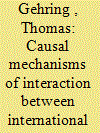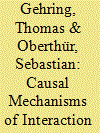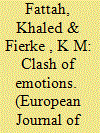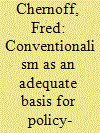| Srl | Item |
| 1 |
ID:
087486


|
|
|
|
|
| Publication |
2009.
|
| Summary/Abstract |
This article develops a conceptual framework for the systematic analysis of the interaction between international institutions as a first step towards building a theory of international interaction. It examines how international institutions may exert causal influence on each other's development and effectiveness and suggests that four general causal mechanisms can elucidate the distinct routes through which influence travels from one institution to another. Institutional interaction can thus rely on transfer of knowledge, commitments established under an institution, behavioural effects of an institution, and functional linkage of the ultimate governance targets of the institutions involved. The article also puts forward hypotheses about the likely effects of specific types of institutional interaction for governance within the international system. The causal mechanisms and types of interaction are mutually exclusive models that help analyse real-world interaction situations. They may also serve as a basis for the systematic analysis of more complex interaction situations.
|
|
|
|
|
|
|
|
|
|
|
|
|
|
|
|
| 2 |
ID:
087494


|
|
|
|
|
| Publication |
2009.
|
| Summary/Abstract |
This article develops a conceptual framework for the systematic analysis of the interaction between international institutions as a first step towards building a theory of international interaction. It examines how international institutions may exert causal influence on each other's development and effectiveness and suggests that four general causal mechanisms can elucidate the distinct routes through which influence travels from one institution to another. Institutional interaction can thus rely on transfer of knowledge, commitments established under an institution, behavioural effects of an institution, and functional linkage of the ultimate governance targets of the institutions involved. The article also puts forward hypotheses about the likely effects of specific types of institutional interaction for governance within the international system. The causal mechanisms and types of interaction are mutually exclusive models that help analyse real-world interaction situations. They may also serve as a basis for the systematic analysis of more complex interaction situations.
|
|
|
|
|
|
|
|
|
|
|
|
|
|
|
|
| 3 |
ID:
087479


|
|
|
|
|
| Publication |
2009.
|
| Summary/Abstract |
After the attacks of 9/11 Americans asked, `Why do they hate us so much?' The answer has been framed in terms of a range of `clashes', none of which has addressed emotion, which is at the centre of the question. Emotion, and particularly humiliation, has begun to be addressed within the literature of IR. Numerous scholars have highlighted the pervasiveness of a discourse of humiliation in the Middle East and its relationship to the swelling ranks of recruits who are willing to act as human bombs. The purpose of this article is to examine the emotional dynamics of this relationship. The first section undertakes a conceptual analysis of humiliation and betrayal. The second section explores how these emotions have been given coherent meaning in the narrative of Islamists from the region. This is followed by an historical analysis of how this narrative has provided a framework for giving meaning to a range of national, regional and international interactions, particularly since 1967, and has contributed to the emergence of Islam as the basis for transnational identity in what had become a highly secular region. Section three examines flaws in the logic of both militant Islamists and the US-led `War on Terrorism', arguing that both have exacerbated feelings of humiliation in the region rather than contributing to a restoration of dignity. The conclusion builds on the principle of human dignity to rethink the international approach to political violence.
|
|
|
|
|
|
|
|
|
|
|
|
|
|
|
|
| 4 |
ID:
087495


|
|
|
|
|
| Publication |
2009.
|
| Summary/Abstract |
This article considers three factual observations about the history of the study of International Relations and examines how well several different metatheories of IR can account for them. The three facts are, first, that there has been persisting disagreement between supporters of contending theoretical approaches; second, that there have been occasional cases in which opposing scholars have converged on certain conclusions; and third, that the field of IR was intended by its founders to have some bearing on policy and some capacity to help change the world. The article contrasts several well-known philosophical principles on which metatheories have been based. The article concludes that all three challenges can be met by only one such metatheory, which I term `causal conventionalism', based in part on principles developed a century ago by Pierre Duhem.
|
|
|
|
|
|
|
|
|
|
|
|
|
|
|
|
| 5 |
ID:
087476


|
|
|
|
|
| Publication |
2009.
|
| Summary/Abstract |
This article examines various implications of democratic peace theory in both the contemporary era and in Greece during the Peloponnesian War era. It considers the evidence for various hypotheses in both contexts, to understand why those hypotheses - especially those concerning institutions - find much better support in the contemporary era. It also addresses the causes and possible consequences of expansionist policies, including hypotheses that democracies are more effective war-fighters and thus better able to pursue successful expansion by military means.
|
|
|
|
|
|
|
|
|
|
|
|
|
|
|
|
| 6 |
ID:
087483


|
|
|
|
|
| Publication |
2009.
|
| Summary/Abstract |
This article explores to what extent the security dilemma through geographically induced first-strike advantages is a contributing cause of ethnic warfare. If there are possibly decisive advantages to be gained from striking the first blow, both temptation and fear may shortcut efforts to resolve a conflict in less costly ways, and trigger massive violence. Theoretical work and case studies suggest that in ethnic conflicts intermingled settlement patterns give rise to such first-strike advantages. I test whether ethnic groups in conflict are more likely to become involved in ethnic warfare if their main region of settlement is ethnically diverse. I also include controls intended to capture other aspects of the security dilemma. In robustness tests, I add indicators of group concentration and local majority status that have been found to increase the risk of ethnic violence in previous quantitative studies. I find a strong, statistically significant association between regional ethnic diversity and ethnic warfare.
|
|
|
|
|
|
|
|
|
|
|
|
|
|
|
|
| 7 |
ID:
087477


|
|
|
|
|
| Publication |
2009.
|
| Summary/Abstract |
Why do national identities usually endure but sometimes radically change? Much of the time, identity socializes or constrains leaders to act in patterned ways. Occasionally, however, leaders are able to dramatically alter those self-images. This article offers a general argument for varying identity plasticity. It brings together organizational theory and social theory to demonstrate how ideas about means to goals can in certain circumstances change how states see themselves. I examine the plausibility of this explanation in cases of continuity and change in Japan's identity in the 19th century and the Soviet Union's identity in the 20th century - in both instances challenging the common wisdom that identity was a direct product of international pressures. The argument suggests the importance of synthetic explanations - i.e. concrete generalizable propositions on how ideas and power interact in specific ways to influence the evolution of national identity.
|
|
|
|
|
|
|
|
|
|
|
|
|
|
|
|